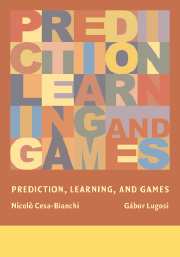Book contents
- Frontmatter
- Contents
- Preface
- 1 Introduction
- 2 Prediction with Expert Advice
- 3 Tight Bounds for Specific Losses
- 4 Randomized Prediction
- 5 Efficient Forecasters for Large Classes of Experts
- 6 Prediction with Limited Feedback
- 7 Prediction and Playing Games
- 8 Absolute Loss
- 9 Logarithmic Loss
- 10 Sequential Investment
- 11 Linear Pattern Recognition
- 12 Linear Classification
- Appendix
- References
- Author Index
- Subject Index
10 - Sequential Investment
Published online by Cambridge University Press: 03 December 2009
- Frontmatter
- Contents
- Preface
- 1 Introduction
- 2 Prediction with Expert Advice
- 3 Tight Bounds for Specific Losses
- 4 Randomized Prediction
- 5 Efficient Forecasters for Large Classes of Experts
- 6 Prediction with Limited Feedback
- 7 Prediction and Playing Games
- 8 Absolute Loss
- 9 Logarithmic Loss
- 10 Sequential Investment
- 11 Linear Pattern Recognition
- 12 Linear Classification
- Appendix
- References
- Author Index
- Subject Index
Summary
Portfolio Selection
This chapter is devoted to the application of the ideas described in Chapter 9 to the problem of sequential investment. Imagine a market of m assets (stocks) in which, in each trading period (day), the price of a stock may vary in an arbitrary way. An investor operates on this market for n days with the goal of maximizing his final wealth. At the beginning of each day, on the basis of the past behavior of the market, the investor redistributes his current wealth among the m assets. Following the approach developed in the previous chapters, we avoid any statistical assumptions about the nature of the stock market, and evaluate the investor's wealth relative to the performance achieved by the best strategy in a class of reference investment strategie (the “experts”).
In the idealized stock market we assume that there are no transaction costs and the amount of each stock that can be bought at any trading period is only limited by the investor's wealth at that time. Similarly, the investor can sell any quantity of the stocks he possesses at any time at the actual market price.
The model may be formalized as follows. A market vectorx = (x1, …, xm) for m assets is a vector of nonnegative real numbers representing price relatives for a given trading period. In other words, the quantity xi ≥ 0 denotes the ratio of closing to opening price of the ith asset for that period.
Information
- Type
- Chapter
- Information
- Prediction, Learning, and Games , pp. 276 - 292Publisher: Cambridge University PressPrint publication year: 2006
